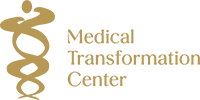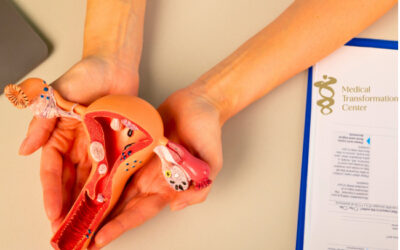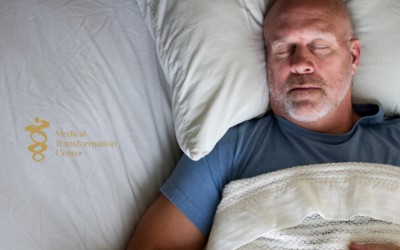As men age, their hormone levels, particularly testosterone and DHT (dihydrotestosterone), naturally decline. This decrease often starts in men’s early 30s and becomes more noticeable by their mid-40s. There is also often another significant drop around age 50.
Symptoms of hormonal imbalance in men include reduced libido and performance, mental fog, decreased energy, reduced muscle mass, bone loss, depression, and weight gain.
Bioidentical hormone replacement therapy (BHRT) could be part of the solution to these issues.
At Medical Transformation Center, we test your hormone levels to confirm any imbalances and check for other possible conditions. Based on your results, we create a customized plan that helps you achieve hormone levels that support your health and wellbeing. This may or may not include BHRT and will certainly include recommendations for diet, movement, supplementation, referrals, regenerative therapy recommendations and much more.
If you’re experiencing symptoms or just aren’t feeling like yourself, contact a integrative cellular and regenerative medicine specialist to see if a whole-person plan including BHRT might be the key to restoring your well-being.
What Is the Role of Testosterone in Men?
Testosterone and dihydrotestosterone (DHT) are the primary androgens regulating male health. Here’s a brief overview of their key functions:
Sex Development
- Fetal Development: Testosterone and DHT develop male sex organs in the womb.
- Puberty: They drive muscle and bone growth, voice deepening, genital and body hair growth.
- Adulthood: About 10% of testosterone converts to DHT daily for various functions.
Metabolism
- Testosterone governs the metabolism of these nutrients. Low testosterone (low-T) leads to slow metabolism, increased fat storage, impaired glucose tolerance, reduced insulin sensitivity, and a higher risk of type-2 diabetes.
Brain Function
- Testosterone affects glucose usage, which is crucial for brain energy, memory, and processing. Low-T can result in “brain fog.”
Bones, Muscles, and Tissues
- Testosterone aids soft tissue growth and repair, works with vitamin D and calcium for bone density, and triggers red blood cell production. Aging reduces testosterone, affecting bone calcium, muscle mass, and red blood cell count.
Reproductive System
- Testosterone stimulates sperm production and maintains male libido.
Mood and Behavior
- Low testosterone can trigger depression, mood swings, and loss of motivation. High levels may cause aggression.
Skin and Hair
- Testosterone influences sebum production and hair growth. Aging affects skin dryness and hair brittleness.
Anabolic and Androgenic
- Anabolic refers to their role in building muscles and tissues. This is why anabolic steroids, synthetic versions of testosterone, are so effective. Androgenic involves their influence on eating, fighting, and sexual drive.
In short, testosterone and DHT are essential for a wide range of bodily functions, from development and metabolism to mood and hair growth.
Hormonal Imbalance and Its Causes
Hormonal imbalances, particularly a decline in testosterone, can have numerous causes and widespread effects on men’s health. Here’s a summary of the key factors contributing to low testosterone levels:
Age and Genetics
Aging is the primary cause of low testosterone, with levels naturally starting to decline around age 30. This decrease is gradual, about 2% per year, leading to significant reductions over time. By age 45, about 40% of men experience low testosterone (“low-T”), and this number increases in older age groups. Genetics also play a critical role, as well as the baseline normal level of testosterone a man has grown accustomed to in his young adult life.
Lifestyle Habits
Lifestyle choices significantly impact testosterone levels. Factors such as smoking, excessive alcohol consumption, obesity, and poor diet can contribute to hormonal imbalances. While lifestyle changes can help manage symptoms, they are often most effective when combined with treatments like bioidentical hormone replacement therapy.
Disease and Medication
Several medical conditions and treatments can lead to low testosterone:
- Hypogonadism: Can be inherited or caused by cancer treatments, injuries, or diseases like mumps.
- Secondary Hypogonadism: Associated with conditions like HIV, inflammatory diseases, and pituitary gland disorders.
- Other Conditions: Type 2 diabetes, sleep apnea, heart disease, stroke, high cholesterol, hypertension, liver cirrhosis, kidney failure, and genetic conditions.
- Medications and Toxins: Exposure to external estrogen sources, cancer treatments, opioid use, and steroid medications can disrupt hormonal balance.
Testosterone is crucial for various bodily functions beyond sexual and reproductive health. Its loss can significantly impact quality of life. Understanding the root cause of low testosterone often requires a comprehensive medical exam.
Bioidentical Hormone Replacement Therapy
Bioidentical Hormone Replacement Therapy (BHRT) uses hormones identical to those produced by the human body to treat hormonal imbalances. Unlike traditional hormone replacement therapy, which uses synthetic hormones, BHRT utilizes hormones derived from plant materials like yams or soy. These bioidentical hormones mimic the structure and function of natural human hormones.
During the initial consultation, it is crucial to disclose any allergies, as bioidentical hormones may contain soy or other allergens. If unsure about allergies, testing will be conducted. Typically, high-quality BHRT avoids sourcing hormones from materials that could trigger common allergies or dietary restrictions, such as gluten and soy.
Reintroducing bioidentical testosterone can alleviate many symptoms associated with low testosterone in men and can serve as both a relief and a preventative measure against hormonal imbalances.
Bioidentical testosterone, being structurally identical to natural human testosterone, is readily absorbed by the body and minimizes the risk of rejection and side effects. Unlike traditional testosterone therapy, which uses a general dosage approach, bioidentical hormone replacement therapy (BHRT) is tailored to each individual’s needs through precise dosages determined by specialists. This customization leads to faster and more effective results.
Derived from natural sources, bioidentical hormones have lower risks of adverse effects compared to synthetic hormones previously used in hormone replacement therapies. Due to these advantages, BHRT is often considered a safer and more reliable alternative for those with testosterone deficiencies or imbalances.
The Importance of a Comprehensive Approach to Testosterone Imbalance in Men
Once you begin supplementation with bioidentical testosterone, it’s possible that your body may reduce its testosterone production even more, as it is now getting some from an external source. That’s why it’s crucial to approach BHRT for men in a way that seeks to support the man’s natural testosterone production first!
In seeking to boost your natural, internal testosterone production, we will do a comprehensive exam to understand the various factors that are causing your low-T in the first place. Afterward, we will create a multi-faceted plan that draws upon tools from traditional, regenerative and cellular medicines to craft an integrative guidemap towards optimizing your hormone levels.
This Personalized Testosterone Production (and overall health boosting) plan will include recommendations for regenerative therapies, the highest-grade supplementation and/or IV nutrition, general lifestyle and diet recommendations, a personalized exercise program, suggestions for reducing environmental toxins and stressors as well as other suggestions to help your body function optimally at a cellular level. In increasing your cellular efficiency, all of your body’s systems work better, including those that are contributing to your lowered or imbalance hormone levels.
Consult with a Professional Who Specializes in Bioidentical Hormone Replacement Therapy
The first step in addressing a possible hormone imbalance is to schedule a consultation with a doctor specializing in bioidentical hormone replacement therapy (BHRT) to learn more about the benefits of hormone replacement therapy. During the consultation, you will discuss your symptoms, health, and lifestyle, and receive orders for a range of diagnostic tests including labs, referrals to other specialists, ultrasounds and more. This helps get enough information to determine if BHRT, in combination with other treatments, is suitable for you and if so identify the best delivery method.
If you can come to Louisville, KY, learn about our personalized treatment plans, an integral piece in addressing low-T levels, and discover if you’d like to have on developed specifically for you at Medical Transformation Center.





